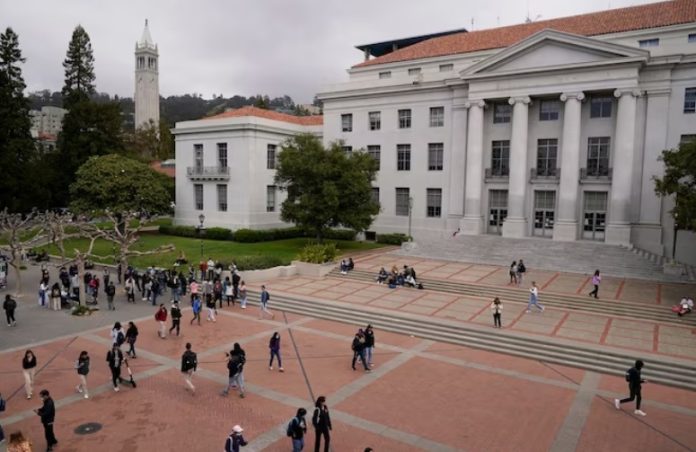Ever since the Holocaust, most of the world’s Jews have seen the future in one of two political projects: the state of Israel and American liberalism, according to The Washington Post.
After 1948, Jews controlled Israel and they could use their state as a defence. At the same time, American liberalism sought a politics of pluralism underpinned by the rule of law. American Jews helped expand this system and flourished within it in the 20th and 21st centuries.
The sudden military conflict on 7 October in southern Israel challenged Jewish faith in Israel’s defencive capabilities. In the United States, Jews do not face such vehement threats. However, the reaction of elite universities to the massacres in Israel has shaken some Jews’ faith in the core institutions of American liberalism.
At some universities, American students have come out in defence of Hamas, but many universities themselves are hesitant to take an official stance on these events. President Cornell’s first letter stated that “loss of life is always tragic, whether it is caused by human actions such as terrorism, war or mass shootings, or by natural disasters such as earthquakes, fires or floods.”
This attitude provoked a political revolt, including among donors. Former Utah Governor Jon Huntsman announced that his family foundation would no longer send donations to the University of Pennsylvania. The president of the Hebrew University of Jerusalem wrote letters to Harvard and Stanford, calling each institution a “lighthouse of wisdom” that “has failed us.” Journalist Bari Weiss reflected the widespread sentiment, writing that “campus administrators, who are so quick to make statements about climate change, the war in Ukraine, and Roe v. Wade, remain silent or ambiguous …. in the face of mass murder.”
All this public outrage is understandable, but it is essential that all sides draw only the right conclusions from this episode. Identity politics is at the heart of the ideology of elite American universities, not freedom of enquiry and liberal neutrality. Under identity politics, groups deemed marginalised are entitled to affirmation. However, Jews have never been a good client group in identity politics. So when Jews demand that universities acknowledge a cause close to their hearts as readily as they acknowledge other causes, they are pulling a familiar lever on a broken mechanism, The Washington Post reports.
Why don’t Jews have a place near the privileged groups that deserve official sympathy and recognition from universities? If only because Jews in the United States – at least those non-Orthodox Jews most often represented on university campuses – are likely to be relatively affluent. From the perspective of progressives, this puts Jews in a different category from other minorities. In 2020, California considered a model ethnic studies curriculum for high schools (it was eventually blocked by Governor Gavin Newsom) that required students to write an essay on “Jewish and Irish Americans Achieve Racial Privilege.”
However, this is not about the demographics of American Jews, but about the ideology of social justice itself.
“Despite its laudable goal of opposing racism and white supremacy,” the academic Pamela Paresky wrote in the Jewish journal Sapir in 2021, critical race theory “relies on narratives of greed, appropriation, unmerited privilege, and hidden power — themes strikingly reminiscent of familiar anti-Jewish conspiracy theories.”
If the world is most often dominated by the powerless over the powerful, to which group should Jews be placed? Group essentialist thinking on the right or left rarely ends well for Jews.
American Jews and their supporters are playing by the rules of identity politics by demanding that universities recognise Jewish suffering after the massacres in Israel. This is fair enough, because they demand the same conditions for Jewish victims, and perhaps universities under pressure will temporarily submit to these demands. However, in the long run, the Jews will not emerge victorious in this struggle, according to The Washington Post.
Instead of trying to get an ever-smaller share in the identity politics profiteering system, Jews should stop pressuring universities into this situation. As stated in the Calven Report prepared by the University of Chicago in 1967:
“The university is the home and sponsor of critics; it is not itself the critic.”
However, this is not compatible with the ideology of critical theory for which liberal neutrality is an oppressive factor. Following Kalven’s principle means opposing universities throwing their institutional weight behind any and all progressive causes.
The aftermath of the massacres in Israel, should make influential people pay close attention to what higher education is now. Critical theories of ‘resistance’ and ‘decolonisation’ are largely anti-Israel and sometimes vehemently so. However, the answer cannot be to let academic identity politics run as long as Jews are among the beneficiaries. This will not work, and if universities are seen to be fomenting and encouraging identity politics except when it is directed against Jews, it could lead to a further rise in anti-Semitism. The problem needs to be addressed at its source.
In Israel, Jews in the aftermath of the massacre are rebuilding their defences and perhaps bridging some political divides. American Jews can most productively devote themselves not to fighting for a place among the victims of critical theory, but to reviving the fading liberal tradition of the United States.
